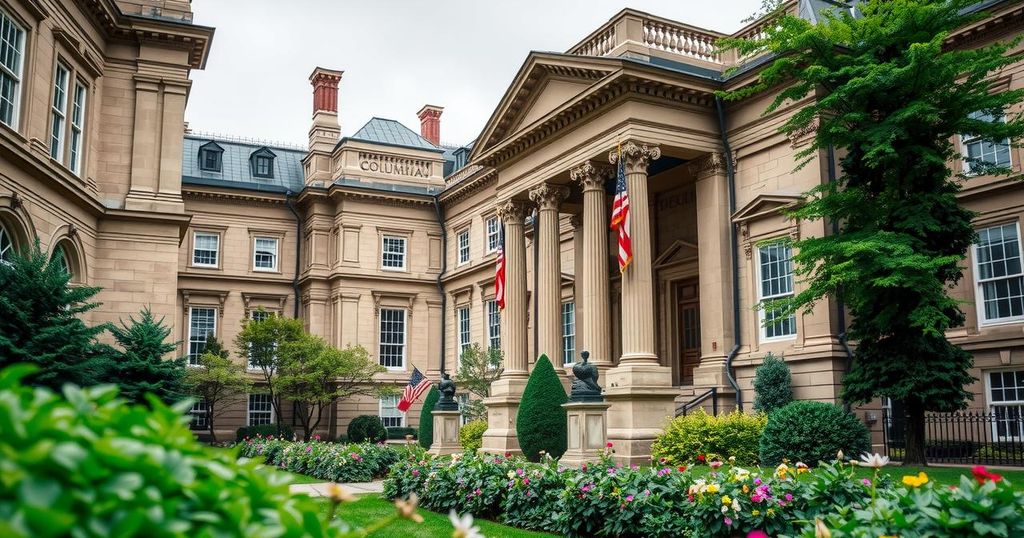World news
AP, ARRESTS, ASIA, COLUMBIA, COLUMBIA UNIVERSITY, DEPARTMENT OF HOMELAND SECURITY, EUROPE, FOLEY SQUARE, HUMAN RIGHTS, INDIA, IRELAND, JUDICIARY, JUSTICE DEPARTMENT, KHALIL, LAW, MAHMOUD KHALIL, MANHATTAN, MANHATTAN FEDERAL COURT, MARCO RUBIO, NEW JERSEY, NEW YORK, NEWARK, NORTH AMERICA, PHOTO, POLITICS, SHANNON, SHANNON AIRPORT, TED SHAFFREY, TRUMP ADMINISTRATION, U. S, U. S. JUSTICE DEPARTMENT, UNITED STATES, US, VIOLENCE
Fatima Alavi
0 Comments
Investigation of Columbia University by Justice Department Amid Immigration Concerns
The Justice Department is investigating allegations that Columbia University concealed illegal aliens, particularly connected to pro-Palestinian protests. Recent federal actions included searching university residences and revoking student visas. The university faces pressure from the Trump administration to implement various changes, amidst debates on free speech and criticism of Israel.
The U.S. Justice Department is currently examining allegations that Columbia University may have concealed illegal immigrants on its campus. This inquiry arises amid a heightened effort by the Trump administration to deport individuals, particularly those associated with pro-Palestinian demonstrations at the university during the previous year. This investigation coincides with recent actions taken by federal agents, including warrant executions at university residences.
Two related incidents have emerged from the ongoing investigation: a doctoral student from India fled the country after his visa was revoked, and a Palestinian individual, arrested during protests, was apprehended for overstaying her visa in Newark, New Jersey. As part of the investigation, Deputy Attorney General Todd Blanche indicated that the focus includes potential violations of civil rights laws and possible involvement in terrorism-related activities.
During a recent press briefing, Deputy Attorney General Todd Blanche stated that the search was prompted by evidence of Columbia potentially harboring undocumented individuals. The Justice Department did not clarify whether accusations were directed at the university itself or individuals involved in the protests. Columbia’s interim president, Katrina Armstrong, expressed dismay at the federal presence on campus, emphasizing the institution’s commitment to lawful conduct.
In light of the federal scrutiny, Columbia University has faced significant pressure from the Trump administration, which includes the cancellation of $400 million in federal grants largely for medical research. This decision was a response to the administration’s perception that the university has not adequately limited criticism of Israel’s military actions related to Gaza protests that occurred the previous spring.
The administration has made several demands of Columbia, threatening to withdraw federal funding indefinitely unless they implement various changes, including altering admissions processes and reconfiguring faculty control over certain departments. Amid these tensions, student and faculty participants argue that advocating for Palestinian rights does not equate to antisemitism, despite varying opinions within the Jewish community regarding feelings of safety on campus.
The aftermath of the arrest of activist Mahmoud Khalil, who played a significant role in last year’s protests, has heightened tensions on campus. The Trump administration has revoked the visa of another student for allegedly promoting violence, although specific evidence has not been disclosed. Meanwhile, the individual arrested in Newark had previously lost her student visa due to lack of attendance and is now in an immigration detention facility.
In summary, the ongoing investigation by the U.S. Justice Department into Columbia University raises complex issues regarding immigration, free speech, and institutional integrity. The university faces significant governmental pressure and penalties for its alleged failure to regulate protests against Israeli actions. In this climate, Columbia seeks to balance legal obligations with the principles of academic freedom and discourse.
Original Source: apnews.com




Post Comment